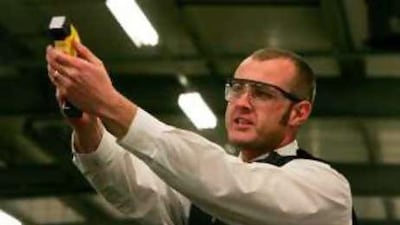LONDON // Electronic stun guns are to be issued to all front line police officers in England and Wales. The Taser guns, which temporarily disable suspects with 50,000 volts of electronic current, are to be issued to 30,000 police officers in a bid to tackle increasing violence on the streets. At the moment, only about 7,500 specialist firearms officers are permitted to carry the weapons, but Jacqui Smith, the home secretary, announced yesterday that 10,000 more of the Tasers were to be bought to enable all beat officers to be equipped with them.
Ms Smith said the move would allow patrol officers, who are not routinely armed in Britain, to "confront dangerous people", disabling them before incidents descend into violence. Civil rights groups, however, questioned the safety of the weapons, and said more than 320 people had died in the United States since 2001 after being shot by Tasers - figures "not recognised" by the Home Office. Alan Campbell, the home office minister responsible for crime reduction, told the BBC yesterday the government had only taken the decision to make the guns generally available after being assured by an independent medical panel that they posed a low risk.
"They're used under very strict circumstances and there are very clear guidelines," he said. "Last year, they were only used on 93 occasions out of the more than 600 that they were deployed. "We don't expect them to be used as a weapon of choice routinely. I am sure one of the intentions is to make sure we don't need to use guns as often." But Oliver Sprague, a spokesman for Amnesty International UK, said that, aside from safety concerns, there were fears over the use of stun guns on vulnerable people with emotional problems or who were under the influence of drugs.
"Amnesty is not opposed to the use of Tasers but they should be limited," he said "No matter how intensive the training is, the officers will only have had two days' worth." Mr Sprague described it as an "extreme" move to buy 10,000 more of the weapons and called on Ms Smith to think again about the decision. Lembit Opik, a spokesman for the Liberal Democrats, also voiced concerns about issuing the weapons to beat officers. "We're talking about increasing the firepower of the police in a way that I think brutalises the entire service," he said.
However, the move was welcomed by groups representing the police. The Association of Chief Police Officers said 10 forces had already been involved in trials which had shown that, in the majority of cases, the presence of the Tasers had helped police resolve incidents without the need to fire the weapon. Simon Reed, the vice-chairman of the Police Federation of England and Wales, which represents rank and file officers, said the wider availability of Tasers would be applauded by officers routinely confronted by violent incidents.
"During the trial, which was for specially trained officers - and I stress not firearms officers, but normal patrol officers - the Tasers were drawn on 600-odd occasions and only actually discharged on 93 occasions," he said. "So it shows how measured and proportionate the use of that device was. And it was for very serious violence or threats of violence." The Tasers are air-powered weapons that fire two small harpoons attached to thin, electric cables. Once the suspect is hit, he or she is temporarily knocked out by the 50,000-volt shock. The weapon is effective up to about 6.5 metres.
dsapsted@thenational.ae

